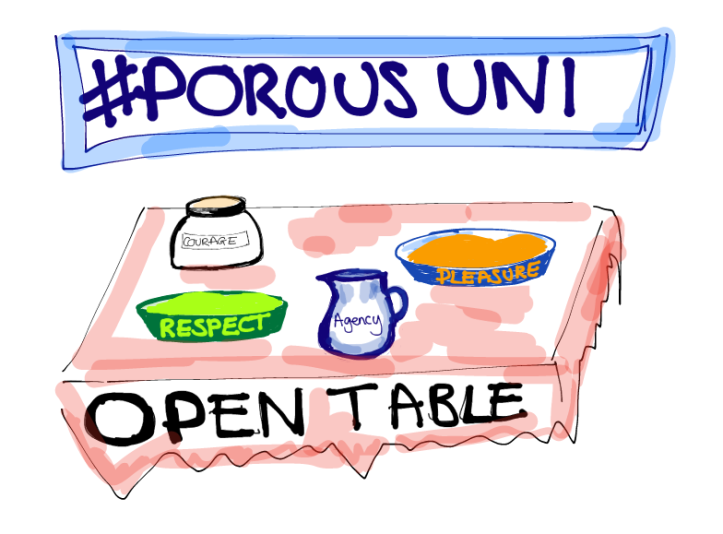.png)
The course was co-developed with carers and the Open University in Scotland and subsequently a companion badged open course for employers (Caring Counts in the Workplace) was launched in June 2015. Caring Counts aims to help carers and their employers understand the skills involved in, and developed through, caring roles and to help carers reflect on and think about possible next steps and future plans.
Based in Dumfries Lesley has been studying part-time for a Business degree since 2013. In addition she works part-time and also has two children, one of whom has autism. Lesley has regularly attended a nearby carers’ centre for a number of years and it was here that she first found out about the Caring Counts course:
“I think that it made me more confident to apply for the degree, and from that I’ve done different jobs, I’m more financially secure. I know my family have all said they’re really proud of me, as are the others’ families really proud of them.”
Following Caring Counts Lesley went on to study an Openings course from the Open University called Making sense of the Arts before applying to her local University to study for her Business degree. Since April 2015 she has also served as a non-executive director for her local health board.
Introducing Caring Counts
Lesley was first introduced to Caring Counts via her local carers centre who had distributed flyers on the course and sent emails to everyone to assess interest in the scheme. Members of the Caring Counts team subsequently went to talk to interested participants about the resource. Lesley and two other carers at the centre began using the material and they would support each other – meeting for coffee, texting or talking to each other – whilst more formal support came from one of the Caring Counts team, who would drop round to the Carers Centre every so often to check in on participants.
Lesley studied Caring Counts at home but participants could also use the carer centre facilities to access the course materials. All participating carers were later asked to participate in a short interview, footage of which was used in the course and elsewhere:
“… We were able to share our own experiences of being a carer and how each of us really had had disruption, I suppose, to what our plans had been and all of us had had to give up working at some point. And it was really just sharing our experiences and then going on to show and hopefully show other people that you can access further education, if you want to, through the Caring Counts.”
The Right Time
Critical in the material’s appeal for Lesley was the “timing” of both her and her fellow carers’ introduction to Caring Counts in addition to the “flexible” structure of the material and working alongside with others on the material:
“…it was the right time of our lives where we were probably looking for something to do. And what appealed the most was that it was flexible because when you’re a carer obviously a lot of your time is taken up with that responsibility and it’s hard to find time to yourself. But the fact that it’s flexible and can be done in your own time, at your own pace, but was also supported … and what helped I think our particular group was the peer support. I don’t know how successful I’d have been, or if it had been as successful, if I had done it all on my own. So for me it worked for those reasons.”
Listen to Lesley talk about what motivated her to get involved in Caring Counts
Challenges
In addition to juggling multiple commitments, Lesley reflected in interview on some of the other challenges that carers face:
“Other challenges I think, are financial, and these courses are free. Accessibility because local courses – at various times that I’ve tried to do them, more traditional ones - the timing hasn’t fitted in around caring for my son. Probably through years of caring you start to get a bit of low self-esteem, which can make you stop pushing yourself forward for things. And just generally get a bit tired. You need to know you can do something in bite-size chunks; otherwise you can get a bit overwhelmed. They’re the main challenges, I’d say.”
Since using Caring Counts materials Lesley has been interviewed by a local magazine, spoken at events and on the radio and chatted to other carers about the Caring Counts course. She reflected on the different responses of carers to the Caring Counts material; noting in particular the timing of one’s introduction to the material and the impact of if, and how, one relates to one’s role as carer. Some people with caring responsibilities don’t want to ‘label’ themselves as such or are overwhelmed by the demands of their caring role, for example:
“…I’ve questioned that myself. I don’t know why that is. Maybe those carers get their support or their time away from caring in other ways that I don’t. Or maybe they are already in work or maybe they’re just not interested, I don’t know. But I have wondered why, when it’s been really successful for us, why it hasn’t been picked up more … I know that a lot of people get stressed and depressed and they literally don’t have the energy … that’s why I do wonder whether like all of our children are now teenagers, whether it would maybe be people with older children who got a bit more used to dealing with it, dealing with all the health professionals, education, all the people you have to speak to … me and [fellow carer] weren’t working so we had spare time when they were at school. I think it’s still maybe only going to get a few people at the right time… because of the nature of caring and … well I know now in my job as well it has a real impact on people’s physical and mental health…”
Using Caring Counts
.jpg)
Materials that are no cost, can be studied at one’s own pace but feature a support structure (be it fellow students, via forums or face-to-face or with an instructor) were described as being important factors that contributed to Lesley’s successful use of Caring Counts. In addition, the ease of using materials and the content were important, as Lesley noted: “It’s a good website to navigate and it’s good to see other people’s stories. I think that’s always helpful so you don’t feel that you’re the first person doing it or you’re doing it in a void.” That the case studies featured a range of carers talking about their experiences Lesley described as being a plus point.
Lesley had advice for others considering using the course:
“…To remember it’s at your own pace… to take the first step and if you haven’t got peer support get someone to tell you ‘well done’ for doing it and build your confidence like that … I never projected ahead… I took it a step at a time. I would also, if it’s possible at all, to do it with someone else … when you’ve an assignment it’s really good to talk to someone else about it. If you can’t actually be with people physically then maybe use the forum.”
Impact: Building Confidence
For Lesley Caring Counts “… has had a massive impact… I think it was the first step in regaining confidence back a bit…” However, Lesley was also keen to point out that although both she and fellow carers who had used the materials at the same time had progressed in ways that they hadn’t envisaged when they first started using the material, the idea of radical or pronounced change as a result of participating in a course such as Caring Counts could be a barrier to initial engagement with the material. This is particularly the case as carers often face a range of challenges such as mental and physical health issues, perceived lack of time or an unwillingness to acknowledge their own role as carer:
“But also I think it’s probably important … because sometimes I feel like I’m a success story and [fellow carer] is but it doesn’t have to be that massive big deal because that could put people off from doing it. If I had been at a different place in my life like ten years ago I would have thought a bit daunted by that. It’s what every individual needs and to take that first step. Because it doesn’t mean if you do it, you have to do all these other things. It just happened that that worked for me and [fellow carer] and it’s what we wanted. …And I know I’ve mentioned it to other carers and they’re not always interested. And I don’t know if that’s because sometimes people don’t even really want to talk about it, they just want a job where they go, or a part of their life, where they’re not thinking about their caring role. So I don’t know if it’s for everyone but it was certainly good for us.”
Picture Credit: Lesley via Caring Roles, Working lives blog and resources given out at the Caring Counts in the Workplace launch (CC-BY 4.0, Beck Pitt)
Originally published 8 February 2016 - 2:36pm by Beck Pitt


